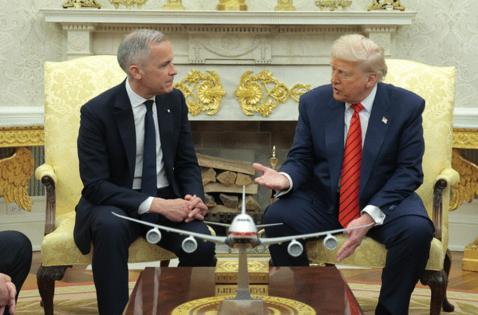Trump ends trade talks with Canada, threatens to set tariff
Published in News & Features
WASHINGTON — President Donald Trump said he was ending all trade discussions with Canada in retaliation for the country’s digital services tax, and threatened to impose a fresh tariff rate within the next week.
“Based on this egregious Tax, we are hereby terminating ALL discussions on Trade with Canada, effective immediately. We will let Canada know the Tariff that they will be paying to do business with the United States of America within the next seven day period,” Trump posted Friday on social media.
Canada and the U.S. have one of the world’s largest bilateral trading relationships, exchanging more than $900 billion of goods and services last year. Canadian Prime Minister Mark Carney, speaking briefly to a television reporter, said he hadn’t spoken with Trump yet on Friday. “We’ll continue to conduct these complex negotiations in the best interests of Canadians,” he said.
The Canadian dollar dropped more than 0.5% almost immediately after Trump’s post before paring those losses. Canada’s benchmark equity index fell, and the shares of companies that rely on moving goods across the border, including General Motors Co. and apparel maker Canada Goose Holdings Inc., also took a hit.
Dozens of countries face a July 9 deadline for Trump’s higher tariffs to kick back into place, and have been engaged in negotiations with the U.S.
That deadline doesn’t apply to Canada and Mexico. The president imposed tariffs on the U.S.’s North American neighbors earlier this year over fentanyl trafficking and migration concerns, and talks with them are being handled on a separate track. Last week, Trump and Carney met at the Group of Seven leaders’ summit and agreed to try to hash out an agreement by the middle of July.
Canadian business groups and some politicians quickly applied pressure on Carney to drop the digital tax.
“In an effort to get trade negotiations back on track, Canada should put forward an immediate proposal to eliminate the DST in exchange for an elimination of tariffs from the United States,” said Goldy Hyder, chief executive officer of the Business Council of Canada.
Ontario Premier Doug Ford reiterated his call for the prime minister to abandon the digital tax.
“We’ve long supported the idea that global tech giants should pay their fair share in the countries where they operate. But the digital services tax hasn’t achieved that,” the Council of Canadian Innovators, which represents technology executives, said in a statement. “It’s functionally a pass-through cost paid by Canadian advertisers and consumers, and it leaves our economy exposed to draconian trade retaliation.”
U.S. Treasury Secretary Scott Bessent on Thursday announced a deal with G-7 allies that will exclude U.S. companies from some taxes imposed by other countries in exchange for removing the Section 899 “revenge tax.” However, the deal didn’t address digital services taxes placed on large technology firms by some countries, which are opposed by Trump and his officials.
Canada’s digital services tax is not new. It was passed into law a year ago, but companies haven’t had to pay it yet.
Carney’s government is poised to proceed with implementing it, however, with the first payments due Monday, the country’s finance department said earlier Friday. Business groups in the country have opposed the levy, arguing it would increase the cost of services and invite retaliation by the U.S.
A group of 21 U.S. lawmakers wrote to Trump earlier this month asking him to push for the tax’s removal, estimating it will cost American companies $2 billion. Trump in his trade push has long railed against taxes and other non-tariff barriers, casting them as an impediment to U.S. exporters.
The Canadian digital services tax is similar to those implemented by other countries, including the U.K. The levy is 3% of the digital services revenue that a firm makes from Canadian users above C$20 million ($14.6 million) in a year. It would apply to companies including Meta Platforms Inc. and Alphabet Inc. and has been criticized by other technology companies such as Uber Technologies Inc. and Etsy Inc.
However, Canadian Finance Minister Francois-Philippe Champagne suggested last week that the digital tax may be renegotiated as part of U.S.-Canada trade discussions.
“Obviously, all of that is something that we’re considering as part of broader discussions that you may have,” he said.
-------
—With assistance from Laura Dhillon Kane, Thomas Seal and Jordan Fabian.
___
©2025 Bloomberg L.P. Visit bloomberg.com. Distributed by Tribune Content Agency, LLC.







Comments